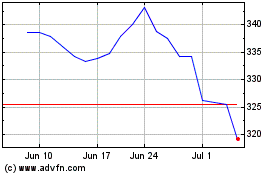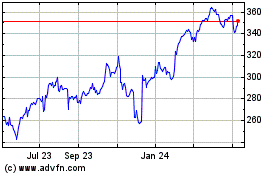Employees in Developing Countries Have More Health Risks and Higher ‘Presenteeism’ Than Those in Developed Countries
August 28 2017 - 10:00AM
Business Wire
Global Cigna Study Shows Clear Relationship
Between Country of Employment and Employee Health Risks and
Productivity
Cigna Corporation (NYSE: CI), a global health services company,
announces publication of its research results which show that there
is a clear difference in health risks for employees from developed
countries and those from developing countries that employers can
address through well-being programs for their global
workforces.
“Where a person lives is a key predictor of his or her
productivity,” said lead researcher, Dr. Jose Quesada, Cigna GHB
Chief Medical Officer. “Overall, employees in developing countries
report having more health risks than those in developed countries –
82.1% of these employees reported having more than one health risk,
such as smoking or existing medical conditions, versus 72.7% of
employees from developed countries.”
The developing country group, however, fared better than the
developed country group on obesity, with one-sixth (15.2%) of the
developing group classified as obese (i.e., BMI of 30 or over)
compared to almost a quarter of the developed group (24.3%). That
said, there is a growing trend of lifestyle-related illness in
developing countries. In this study, the developing country group
reported slightly higher rates of anxiety and/or depression (18.8%)
than in developed countries (14%), as well as slightly higher heart
risk factors.
Conducted by Cigna GHB Chief Medical Officer, Dr. Jose Quesada;
Dr. Peter Mills, Associate Medical Director; and Ana Howarth,
Research Scientist, the study fills an important information gap
for global employers who use western-centric health risk assessment
(HRA ) to predict employee health and behavior around the
world.
“The Cigna GHB study found that there are significant
geographical differences between HRA scores and performance,” said
Dr. Quesada. “We learned that place of residence was the biggest
predictor of presenteeism (where an employee is physically present
at work but not productive or engaged) and poor pain management was
the biggest predictor of absenteeism.”
“These findings are particularly valuable to employers, as
health risks highlighted by HRA can be improved with the support of
effective well-being programs,” said Dr. Quesada.
These are some of the key findings of a global, cross-cultural
study by Cigna Global Health Benefits (GHB), published in The
Annals of Occupational and Environmental Medicine, Springer Nature,
June 12, 2017. The study analyzed HRA data collected from 117,000
employees of 254 multinational companies over a four-year
period.
The research confirms there is a large body of evidence
supporting the effectiveness of well-being programs on improving
numerous aspects of employee health – positively impacting employee
productivity and lowering employee absenteeism.
“Research like this helps Cigna design health and wellness
services and solutions for its customers that are rooted in
scientific evidence,” said Dr. Quesada.
The full article can be found here.
About the Study
This study used a cross-sectional design to summarize and
compare findings from online HRA completed by multinational
organizations taken over four years from the period 2013 to 2016.
The HRA was administered as an online questionnaire to 254
companies from 120 countries. The final sample consisted of 117,274
employees, aged 18 to 64 years.
About Cigna
Cigna Corporation (NYSE: CI) is a global health service company
dedicated to helping people improve their health, well-being and
sense of security. All products and services are provided
exclusively by or through operating subsidiaries of Cigna
Corporation, including Connecticut General Life Insurance Company,
Cigna Health and Life Insurance Company, Life Insurance Company of
North America and Cigna Life Insurance Company of New York. Such
products and services include an integrated suite of health
services, such as medical, dental, behavioural health, pharmacy,
vision, supplemental benefits, and other related products including
group life, accident and disability insurance. Cigna maintains
sales capability in 30 countries and jurisdictions, and has more
than 95 million customer relationships throughout the world. To
learn more about Cigna®, including links to follow us on
Facebook or Twitter, visit www.cigna.com.
View source
version on businesswire.com: http://www.businesswire.com/news/home/20170828005066/en/
For further information, please contact:Cigna Global Health
BenefitsRobyn R. Ray, +1 302-746-3338Robyn.Ray@cigna.com
Cigna (NYSE:CI)
Historical Stock Chart
From Mar 2024 to Apr 2024

Cigna (NYSE:CI)
Historical Stock Chart
From Apr 2023 to Apr 2024
